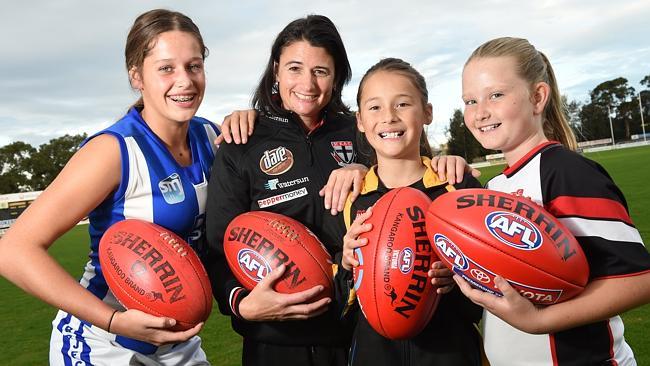St Kilda Football Club makes play for women’s AFL team to be based in Seaford then Moorabbin
St Kilda Football Club is vying for a licence for the inaugural AFL women’s league, hoping to cash in growing female popularity across Melbourne’s south.

Inner South
Don't miss out on the headlines from Inner South . Followed categories will be added to My News.
The St Kilda Football Club has lodged a bid for a team in the inaugural AFL women’s league in response to growing female participation in the sport across Melbourne’s south.
The national league, which will start in February 2017, is expected to consist of eight teams including four from Victoria.
St Kilda chief executive Matt Finnis said the motivation for applying for the licence was to boost equality for women.
“We think for the national women’s league to work there has to be a strong equity mindset,” he said.
“So the model we hope to build is quite an integrated high-performance model.”
The women’s team, to play in a semi-professional capacity in its debut season, will share facilities with the club’s men’s side at Seaford in 2017.
It is expected the side would then move into the redeveloped Moorabbin Oval in 2018.
Mr Finnis said the women would also share football operations staff — including dietitians, physiotherapists and welfare staff — with the men’s team.
“The passion and the growth of the game in Melbourne’s south among the girls says that they deserve a team to represent them and that’s what we would love to be able to provide.”
Mr Finnis said a strong pathway had already been established for female footballers in the area with the St Kilda Sharks and Seaford Tigerettes playing in the inaugural women’s VFL this year.
“We think that (the) Bayside (area) needs a team because its been a bit of incubator for women’s football.”
He said future female players would be able to draw on the experiences of five-time VWFL premiership coach Peta Searle, who is an AFL development coach with the men’s side.
Mr Finnis said the area also boasted a wealth of football facilities including Trevor Barker Oval, Sandringham, Moorabbin Oval and the Peanut Farm Reserve, St Kilda.
“When you are playing in a semi-professional league we shouldn’t be expecting these women in the early stages of their (sporting) careers to be travel all over the countryside to play.”
According to the AFL, female player participation in football has ballooned from 136,000 in 2012 to 319,000 last year.
Mr Finnis said an AFL women’s league was needed to encourage greater participation in football.
“You can’t be what you can’t see and young girls need the role models and something to aspire to.”
Kingston mayor Tamsin Bearsley said the council had written a letter of support for the club’s proposal.
“A national women’s league will provide strong female role models to encourage increased participation in sport among younger girls,” she said.
“The St Kilda Football Club will be well-placed to host a team for the women’s league thanks to the $30 million redevelopment at Moorabbin Reserve currently underway.”
Former Bayside mayor Felicity Frederico said a women’s AFL team based in Bayside side would provide a clear pathway for girls wanting to get to the elite level.
“We see this team supporting a level playing field for women in the Bayside area.”
“Anything that encourages female involvement in sport is great.”



